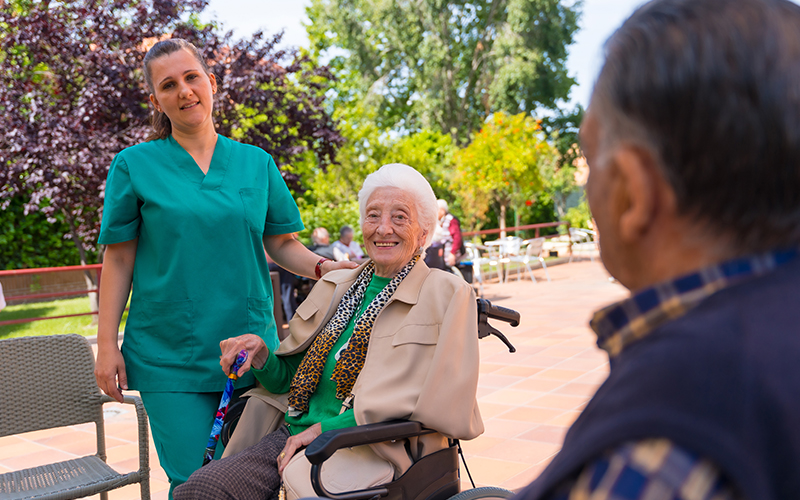Understanding the Causes of Challenging Behaviour in Dementia
Causes of dementia behaviour Durham are not always obvious, but they are essential to understand when supporting people with dementia. At Stockton Lodge Nursing Home & Denehurst Nursing Home County Durham, we know that every behaviour has meaning. Challenging behaviour is often the result of an unmet need, confusion, or distress. By identifying what’s causing the behaviour, we can reduce anxiety and improve the resident’s quality of life.
Dementia affects memory, perception, language, and emotional regulation. This creates difficulties in understanding, communicating, and coping with day-to-day situations. When residents can’t express their needs clearly, they may use behaviour to communicate instead.
What is meant by ‘challenging behaviour’?
Challenging behaviour includes actions that may interfere with care or cause distress. These may include shouting, hitting, wandering, resisting care, or repeating questions. While these behaviours might seem difficult to manage, they often have a very understandable cause.
Pain or physical discomfort
Pain is one of the most overlooked causes. Residents may have toothaches, arthritis, infections, or other conditions they cannot describe. In response, they might become irritable, restless, or even aggressive. We observe body language and facial expressions to detect signs of discomfort when words fail.
Communication breakdown
Dementia often limits a person’s ability to understand and respond to language. When communication breaks down, residents may feel confused or frustrated. If they don’t understand what’s happening or feel they can’t make themselves heard, they may lash out or shut down emotionally.
Environmental triggers
The environment plays a significant role. Loud noises, harsh lighting, or unfamiliar objects can be overwhelming. Even moving a familiar chair can unsettle someone with dementia. At Stockton Lodge and Denehurst, we create calm, consistent surroundings that reduce sensory overload.
Unmet emotional needs
Sometimes the cause is emotional. Residents may feel lonely, frightened, or disoriented. They may not recognise family members or understand where they are. This can cause fear, which may lead to agitation or aggression. Providing reassurance and familiar routines helps ease this emotional strain.
Cognitive confusion and misinterpretation
People with dementia often misinterpret situations. A carer helping with bathing may be seen as a threat. A mirror might be mistaken for another person. These misinterpretations can trigger defensive or fearful reactions. We respond by calmly explaining, gently redirecting, or removing the trigger if needed.
Routine disruption
Dementia residents thrive on routine. Changes in schedule, staffing, or surroundings can lead to confusion and challenging behaviour. We maintain consistent routines and introduce any necessary changes gradually to allow residents time to adjust.
Fatigue and overstimulation
Tiredness can increase the likelihood of challenging behaviour. Too many activities, loud environments, or excessive visitors can overwhelm residents. We structure the day to include rest periods and quiet time, particularly during afternoons and evenings.
Delirium or medical conditions
Sometimes behaviour changes are linked to other health conditions, such as infections or dehydration. These can cause confusion or delirium in older adults. Staff monitor for sudden changes in behaviour, which may indicate an underlying medical issue.
Medication effects
Some medications may cause side effects such as restlessness, drowsiness, or mood changes. Our care teams work with GPs and pharmacists to regularly review medication. If new behaviours appear, medication is one of the first things we assess.
Historical trauma or personal experiences
Trauma can resurface in dementia. For example, a resident who once experienced domestic violence may react negatively to touch. Others may associate uniforms or certain phrases with unpleasant memories. Understanding life history helps us avoid triggers and personalise care.
Why identifying causes leads to better care
When we understand the cause of a behaviour, we can take proactive steps to prevent it. Instead of simply reacting, we respond with empathy and strategy. This reduces stress for the resident and builds trust with carers.
Working with families to understand patterns
Family members are essential partners. They offer insight into past routines, preferences, and life experiences. For example, a family might share that a resident dislikes loud voices or finds comfort in a certain song. This information helps us tailor care more effectively.
Training staff to spot the signs early
At Stockton Lodge and Denehurst Nursing Homes in County Durham, we don’t view challenging behaviour as a problem — we see it as a message. By understanding the causes of dementia behaviour in Durham, we create safer, calmer, and more compassionate care environments for those who need it most.
If your loved one is experiencing distress or difficult behaviours linked to dementia, contact us today. We’re here to support you with expert care and understanding.








